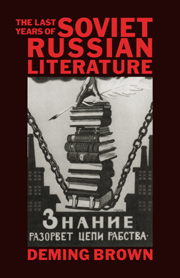Book contents
- Frontmatter
- Contents
- Preface
- Acknowledgments
- 1 The literary situation: publication, genres, criticism
- 2 From “stagnation” to “openness”
- 3 Retrospective writing about the Stalin period
- 4 Village prose: its peak and decline
- 5 The “forty-year-olds”
- 6 Other voices
- 7 “Tough” and “cruel” prose
- 8 New faces
- 9 Conclusion
- Notes
- Select bibliography
- English translations of Soviet Russian prose
- Index
5 - The “forty-year-olds”
Published online by Cambridge University Press: 13 October 2009
- Frontmatter
- Contents
- Preface
- Acknowledgments
- 1 The literary situation: publication, genres, criticism
- 2 From “stagnation” to “openness”
- 3 Retrospective writing about the Stalin period
- 4 Village prose: its peak and decline
- 5 The “forty-year-olds”
- 6 Other voices
- 7 “Tough” and “cruel” prose
- 8 New faces
- 9 Conclusion
- Notes
- Select bibliography
- English translations of Soviet Russian prose
- Index
Summary
Like most twentieth-century commentators on literature throughout the world, Soviet critics have been fond of classifying contemporary writers into groupings, tendencies, and schools. Some kinds of writing lend themselves readily to such classification – examples are the schools of “village prose” and “military prose,” although even in these categories some works do not fit neatly. In the late 1970s critics began referring to a loose grouping of writers whom they called, variously, the “forty-year-olds,” the “Moscow school,” and the “urban school” (gorodskaya shkola). The critics themselves were manifestly dissatisfied with such groupings and readily admitted to their lack of real, much less permanent, cohesion. Such categories, however, provided a convenient and not ineffective means of identifying current literary tendencies, ephemeral as they might prove to be.
This chapter will discuss seven writers who have generally been associated with at least two, and usually all three, of the categories mentioned above. (The approximate nature of such categories is indicated by the fact that although their dates of birth range from 1935 to 1944, they were all identified as “forty-year-olds” in the late 1970s.) Their interests, ideological configurations, and manners of writing vary greatly, but they do have several things in common. All of them are too young to have immediate memories of World War II, although some refer to its indirect effects on their childhood.
Information
- Type
- Chapter
- Information
- The Last Years of Soviet Russian LiteratureProse Fiction 1975–1991, pp. 100 - 123Publisher: Cambridge University PressPrint publication year: 1993
